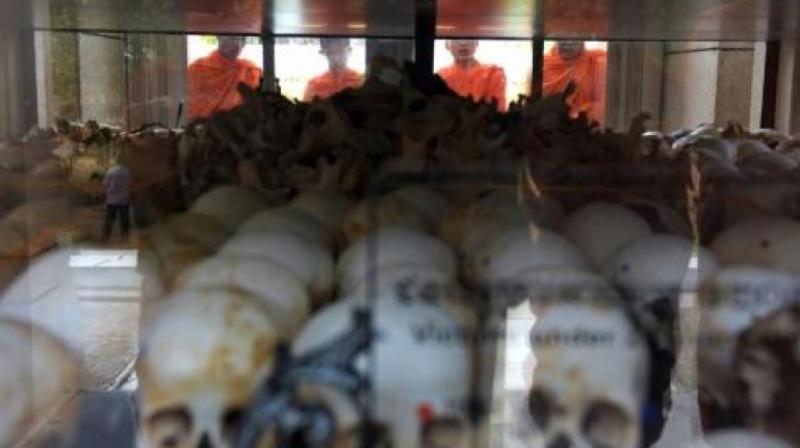UN backed court upholds life sentences for Khmer Rouge leaders

Phnom Penh: Cambodia's UN-backed court upheld life sentences for two top former Khmer Rouge leaders on Wednesday for crimes against humanity, in a verdict welcomed by survivors of the brutal regime.
"Brother Number Two" Nuon Chea, 90, and ex-head of state Khieu Samphan, 85, were the first top leaders to be jailed in 2014 from a regime responsible for the deaths of up to two million Cambodians from 1975-1979.
They appealed their convictions, accusing the court of a string of errors and the judges of failing to remain impartial due to their personal experiences under the regime.
In a lengthy ruling on Wednesday after months of hearings, the bench upheld the bulk of the convictions and the jail terms, but accepted some legal errors had been made in the initial trial.
Kong Srim, the Supreme Court Chamber's top judge, said the pair "had a complete lack of consideration for the ultimate fate of the Cambodian population", adding that the scale of their crimes was "massive".
"The Supreme Court Chamber considers that the imposition of a life sentence for each of the accused is appropriate," he said.
Nuon Chea and Khieu Samphan sat impassively as the decision was read out.
The Khmer Rouge regime dismantled modern society in Cambodia in their quest for an agrarian Marxist utopia, killing vast numbers and leaving a generational scar.
"I am so happy with the convictions," Chhun Leap, 74, who lost around 50 relatives during the Khmer Rouge years, told AFP after leaving the courtroom.
"They are monsters and this is their fate."
Few brought to justice
The tribunal, known as the Extraordinary Chambers in the Courts of Cambodia (ECCC), is a complex hybrid court on the outskirts of Phnom Penh combining elements of international and domestic law.
It was set up following an agreement between Cambodia and the United Nations to prosecute senior Khmer Rouge leaders.
The number of allegations against Nuon Chea and Khieu Samphan and the complexity of their cases was so vast that the court split their trials into a series of smaller hearings in 2011, fearful the pair might die before justice could be served.
Their convictions in August 2014 followed a two-year trial focused on the forced evacuation of around two million Cambodians from Phnom Penh into rural labour camps and the murders of hundreds of enemy soldiers at one of several execution sites.
Nuon Chea and Khieu Samphan are also currently undergoing a second trial for genocide of ethnic Vietnamese and Muslim minorities, forced marriage and rape.
But the tribunal has had mixed successes. Despite the sheer brutality unleashed by the Khmer Rouge, survivors have seen just a handful of perpetrators brought to justice.
Many key leaders have died without facing justice, including "Brother Number One" Pol Pot who passed away in 1998.
Four Cambodian judges and three international judges sit in the Supreme Court Chamber that heard the appeal. Rules state at least five out of the seven of them must agree on the verdict to reach an accord.
The tribunal did not reveal how many of the bench supported upholding the sentences.
While the court is seen by supporters as an example of restorative justice, Cambodia's strongman leader Hun Sen, a Khmer Rouge commander who defected has voiced opposition to new cases, warning against reopening old wounds.
The trial of four more Khmer Rouge members on crimes against humanity charges is in doubt after the Cambodian investigating judge on the tribunal failed to sign off on the charges.

